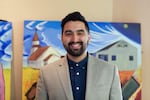
Juan Carlos Gonzalez, the development director at a Washington County community center, made a conscious choice to come home to Oregon.
Anna Griffin / OPB
Juan Carlos Gonzalez grew up in an unlikely sort of bubble. His parents emigrated from Mexico long before his birth and settled in Cornelius, a Washington County town that was 50 percent Latino in the last Census, compared to 8 percent statewide.
"Everything I saw was Latino," he said. "Going to school most of the students there are Latino, so I felt like I was always going to school with people that looked like me, and I appreciate that. When you’re a kid, you don’t really feel like racism is there, you feel like everybody is the same. Then, as you grow up, society tells you you’re different."
For him, that happened at Forest Grove High School. It’s a melting-pot campus, a place where heavily Latino Cornelius and heavily white Forest Grove meet.
"I was one of the very few people of color in the honors classes or the AP classes," Gonzalez said. "There were times when some of my classmates or peers would make comments, 'You’re one of the few.' Or 'Oh, I wish every Mexican could be like you,' or 'You're not like the other lazy ones.' Things like that. You just don't know what to say. You're like, ‘What's going on, I thought I was one of you, I thought we were friends.’"
Related: Black Family Adjusts To Life In Oregon's White Suburbs
So for college, he left.
"When I graduated from Forest Grove, I was just so fed up with it that I wanted to go as far away as possible. So I went to D.C. Then I still wanted to get farther, so I studied abroad in India."
Those experiences of living elsewhere taught him something: Compared to the rest of the world, Oregon is really white.
"When I went to school in D.C., I’m like, ‘This is so different. Oh, wow,’" he said. "When you start to really understand that everyone in charge of driving investment or creating policy, that they don't look like you or understand you at a core level for your experience, then you really start to feel almost small and helpless."
Gonzalez graduated from Georgetown and interned for U.S. Sen. Jeff Merkley. So he could have started his career in public service anywhere.
But three years ago, he came back to Oregon. Now he’s the development director at a Hillsboro community center that serves newly arrived Latino immigrants.
"When my dad first immigrated to the U.S., he was a farmer worker, he worked in nurseries and landscaping and low-income jobs. Centro Cultural was one of the pieces of the fabric that made him feel like he belonged to something here. It's kind of where he and my mom developed their relationship; they'd go to the church group or youth group. It was just a place they could frequent and feel at home. I just felt a responsibility to come back home and continue to fuel that dream for folks like my parents," Gonzalez said.
Last spring, a student at his alma mater, Forest Grove High, put a banner up in the school cafeteria. It said, “Build a wall.” Gonzalez is 24 but still has two sisters at the school. They were among hundreds of students who walked out in protest.
The student who put up the banner later said he was simply trying to make a point about free speech. Gonzalez doesn’t buy it.
"There have been so many times — especially since the election — when I’ll walk into a store, especially in rural Washington County, and I will definitely feel incredibly uncomfortable. I’ll feel stared at. I'll feel that people are looking at me. And I know that climate, of the ‘build a wall’ sign, is only continued and is now more pronounced and is more aggressive.
"I, as a man of color that was born here, already feel targeted. I wouldn't feel shocked, and thankfully it hasn’t happened yet, that someone will come up and tell me, ‘You need to go back to your country.’ What do I say to that? This is my country. This is my state," he said.